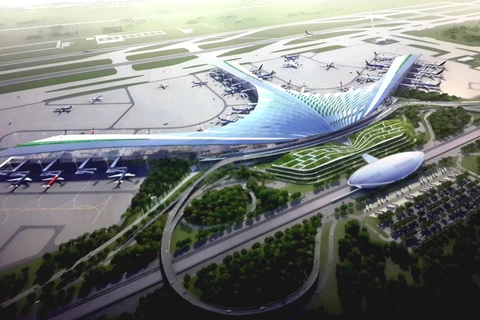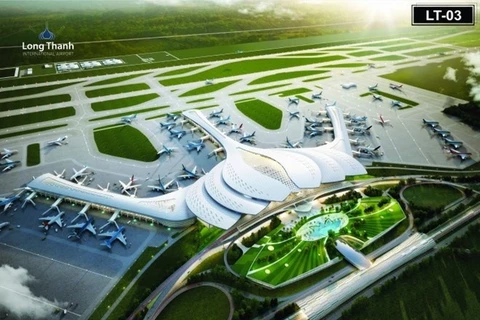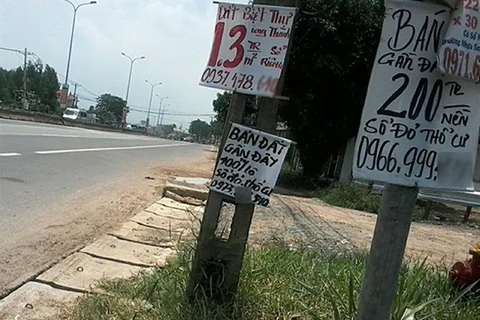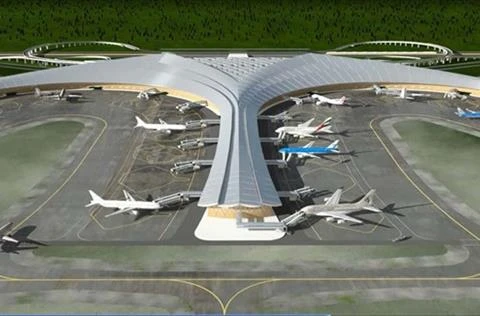Hanoi (VNA) - Heated debate broke out in the National Assembly on November 12 over the feasibility report for the phase-one development of the Long Thanh International Airport in the southern province of Dong Nai.
The session of the NA revolved around preparations for the first stage of the Long Thanh International Airport, which needs an estimated 4.8 billion USD of investment and will be voted on by deputies on November 26.
The Government opted to do without official development assistance (ODA) loans to carry out the project, and proposed the State-controlled Airports Corporation of Vietnam (ACV) be the sole investor.
Deputy Tran Trong Nghia from Ho Chi Minh City said voters and people nationwide agreed to build the Long Thanh airport as soon as possible.
The project includes four important factors, namely economy, society, technique and technology. It is also of importance to the county’s security and national defence.
“Therefore, the project must create momentum for Vietnam to take off and escape from the middle income trap,” he said.
Northern Bac Giang province’s deputy Hoang Thi Hoa agreed with the Government’s decision to not borrow ODA loans as it would increase the country’s public debt.
Southern Binh Duong’s deputy Nguyen Thanh Hong also supported the Government's choice of a Vietnamese company to run the project.
“That will help build up the country’s aviation industry in the future and it will be a breakthrough for economic growth in the coming period,” he said.
“If Sun Group can build Van Don airport, why can’t ACV be like Sun Group?,” Hong asked, citing the example of Van Don Airport in Quang Ninh province which was invested and built entirely by private real estate behemoth Sun Group.
Several deputies, however, were on the other side of the fence.
Hanoi’s deputy, vice rector of the National Economic University, Hoang Van Cuong, said the three reasons the Government gave to the NA explaining its choice were not persuasive enough.
 The model of the Long Thanh International Airport plan in the southern province of Dong Nai. Photo courtesy of the Airports Corporation of Vietnam
The model of the Long Thanh International Airport plan in the southern province of Dong Nai. Photo courtesy of the Airports Corporation of Vietnam
They included ACV’s solid experience in the aviation sector, its stable financial status as 95 per cent of its shares are State-owned and time efficiency as the Government would not have to organise project bidding if the investor is already appointed.
Cuong said the appointment of the ACV could shorten the preparation time by one and a half years but it might not be so throughout the entire project.
“It (the ACV) is a State enterprise so all construction items must be put to bidding, which as a consequence can delay the project. A private enterprise, meanwhile, needn’t hold bidding,” he said.
Cuong also said it was too rushed to conclude that only the ACV had relevant experience in the field. And even if the AVC was the best of its kind, the deputy added, the case of Van Don Airport proved the private sector could also pull off the job.
Regarding investment capital for the airport, Cuong was doubtful the ACV was the best option available. The corporation would have to borrow 2.67 billion USD of the 4.8 billion USD of the total investment for the project, according to a review of the project by the NA’s Standing Committee.
“Three fourths of the investment will be from loans with complicated procedures and the risks are on the State,” he said.
“In the meantime, there are many private companies which are always willing to invest and are very flexible in mobilising capital.”
Lang Son’s deputy Nguyen Thi Lam Thanh also questioned the ACV’s financial capability despite the Government’s claim that the enterprise could mobilise money from its stable revenues at 21 airports.
According to Thanh, only eight of 21 domestic airports earn enough to cover their expenses or are profitable. The rest face losses and won't be able to contribute money to the ACV in the near future.
The mega project Long Thanh International Airport is expected to need total investment of 336.6 trillion VND (14.6 billion). The new airport is hoped to alleviate overloads at Tan Son Nhat Airport in Ho Chi Minh City./.
























